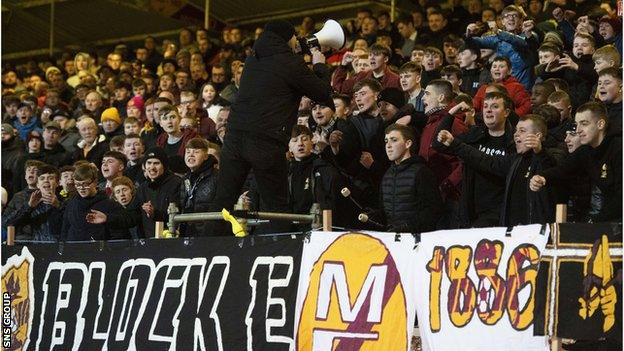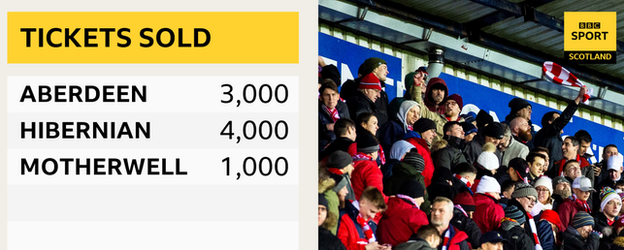Parked cars & cyber season tickets - how might football cope without fans?
- Published

Motherwell have sold over 800 more season tickets than they did at this point last year
It's still unclear when Scottish football might be able to resume, and when it does, whether fans will be present.
Despite that, several top-flight clubs are selling season tickets faster than they did a year ago.
That begs the question - what if those fans aren't allowed to attend games due to continued impact of the coronavirus pandemic?
BBC Scotland looks at what supporters here might expect in the coming months.
The challenge - no sport with fans until vaccine
Countries such as Germany and Denmark are looking to resume domestic football next month, but without supporters. This option seems to be the most feasible for countries keen to restart, with the European Leagues body saying there is "no doubt" football will return behind closed doors.
Hibernian chief executive Leeann Dempster described that prospect "not optimal" given the reliance of Scottish clubs on gate receipts and match day revenue. But given government guidance, is having supporters in grounds this year feasible?
Zach Binney, a PhD in epidemiology, says he expects we won't see sport in packed stadiums until a vaccine is available for Covid-19.
"We probably won't have packed stadiums back until we have a vaccine, and that's 18 months away at everyone's best guess," Binney told BBC Scotland. "So it's probably going to be next year before we can allow that.
"A gathering adds danger from a disease transmission perspective in two ways. One is the greater chanceof someone infected being in that stadium, and the other is even if that person you add to the situation isn't infected themselves, they're at risk of becoming infected and transferring the disease to others."
To add to that, First Minister Nicola Sturgeon said on Monday we should not expect to hold matches in front of fans, if at all, "any time soon", though the government has agreed to be part of the consultation on the issue.
What about season tickets?

Approximate season tickets sold for 2020/21 season as of 21/04/20
So it might not be soon, but when things resume there is a very real prospect of no football for fans in stadiums for the rest of 2020. But remarkably, that hasn't deterred people from buying season tickets.
Some clubs have decided not to put them on sale due to the current uncertainty, particularly with the current Premiership campaign yet to be called.
But what about fans who have bought season tickets for next term already?
Motherwell, Aberdeen and Hibernian are all exceeding sales on last season as their supporters rally around their club during a difficult financial period. Hearts and Dundee have just put theirs on sale and Celtic are also allowing supporters to renew.
At the same stage last year, Motherwell had sold 187 season books. They've flogged 1,000 for next term already.
But if they can't turn up to the games due to restrictions, what happens? There has been a suggestion, external so-called "cyber season tickets" might entitle fans to watch some games via club TV channels. Aberdeen chairman Dave Cormack has talked about the possibility of doing this.
But it would require the co-operation of broadcasters, with Sky Sports holding exclusive rights for next season's Premiership, and not all clubs have their own channels and could afford to create one.
Some fans might be wealthy and generous enough to give cash without watching football just to support their team through a sticky spell, but clubs can't rely on that alone.
Aberdeen operate an 'AberDNA' subscription scheme outwith season tickets, but part of the attraction of buying that is the awarding of loyalty points to secure match tickets.
Ross County chairman Roy MacGregor told BBC Scotland this month that the Dingwall club are yet to put tickets on sale precisely because they can't guarantee supporters what they would be paying for.
"We believe social distancing and needing to keep people two metres apart means we may only be able to fill a tenth of our stadium," he said.
"I can't plan ahead to sign players, or tell season ticket holders only a fifth will get tickets, and be able to watch the football.
"It might be easier for bigger clubs who can stream television into people's home but it won't be for Ross County."
Parked cars & big screens - the Danish approach
Clubs might just have to get creative when the time comes, as they have at Danish side Midtjylland who have set up two big screens to facilitate a "drive-in" for fans.
Space is available for up to 2,000 cars- and therefore around 10,000 fans- to come to the stadium and watch the game, with radio commentary to be provided, as Denmark starts to relax lockdown restrictions and prepare to resume football next month.
Former Celtic defender Erik Sviatchenko is now at Midtjylland and thinks it will help rediscover some of the spirit and atmosphere lost if games are played without fans in the ground, and give supporters something to look forward to.
"Football is about gathering people together in the local community, and the idea from the club was what we could do to enhance that feeling of being together at a football stadium without actually being there," he told BBC Scotland's The Nine programme.
"So they had this idea that a lot of cars could be parked outside the stadium, which there would be if there was a normal game, and put up big screens and they would be with us honking and cheering so we could actually hear them inside the stadium.
"We of course have had talks with the local authorities that this is a safe thing, so I think it's a nice idea and hopefully other clubs around Europe can take inspiration."
It might not be imminent, but football clubs in Scotland might just have to start considering how they can provide value for money to fans who are not allowed to attend matches.
At the moment sales are broadly going well, but that is no guarantee of reaching the same number as previous seasons. Given how reliant clubs are on gate revenue - providing 43% on income - they need to keep cash from supporters coming in, even if they're not there.